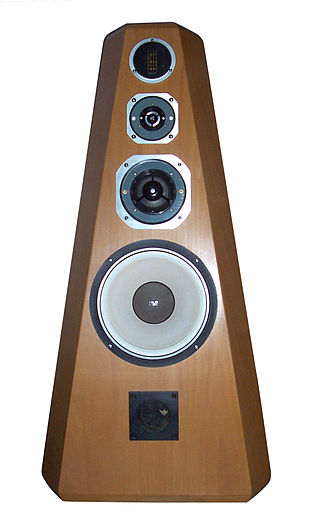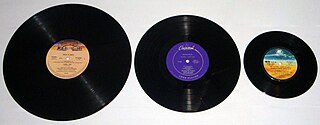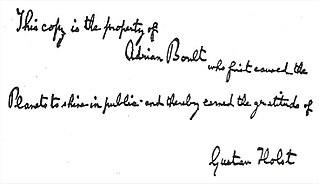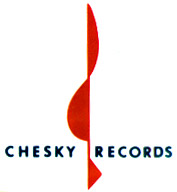Notes and references
Notes
- ↑ Stan Ricker (né Stanley Forbes Ricker; 1935–2015) began his career in Lawrence, Kansas, working for the Century franchise associate. From 1969 to 1974, Ricker served at Keysor-Century's production facility in Saugus as Head of the QC (quality control), overseeing the Recording and Mastering Department, the Pressing and Inspection Department, and the Shipping Department. Ricker went on to become known for his mastering and engineering abilities on revolutionary vinyls by The Beatles, Frank Zappa, Electric Light Orchestra, Stevie Wonder, Pink Floyd, and Eric Clapton. Ricker was particularly known in the industry as a pioneer and exponent of half-speed mastering, a technique where the cutting lathe turns at exactly half the intended playback speed, which gives the cutting head twice as much time to cut complex analogue grooves into the vinyl, which enhances the sonic accuracy. Records that Ricker mastered are often reflected in the matrix code (aka dead wax) as SR or SR/2, or some variation thereof (the "/2" meant that the mastering was done at half-speed).
- ↑ Gabriel Bartold (1919–1980) had been a virtuoso classical trumpeter; as early as 1960, he was (i) director of the Los Angeles Concert Band and (ii) National Director of Custom Recordings for Century Records; he also was the company's first recording engineer. ("James B. Keysor – The Sound Of A Secure Future," Discogs, retrieved May 9, 2017) He and his wife died in an automobile accident on October 31, 1980.
Related Research Articles

High fidelity is the high-quality reproduction of sound. It is popular with audiophiles and home audio enthusiasts. Ideally, high-fidelity equipment has inaudible noise and distortion, and a flat frequency response within the human hearing range.
An audiophile is a person who is enthusiastic about high-fidelity sound reproduction. An audiophile seeks to reproduce recorded music to achieve high sound quality, typically in a quiet listening space and in a room with good acoustics.

A phonograph record, a vinyl record, or simply a record or vinyl is an analog sound storage medium in the form of a flat disc with an inscribed, modulated spiral groove. The groove usually starts near the outside edge and ends near the center of the disc. The stored sound information is made audible by playing the record on a phonograph.
RCA Records is an American record label owned by Sony Music Entertainment, a subsidiary of Sony Corporation of America.

Columbia Graphophone Co. Ltd. was one of the earliest gramophone companies in the United Kingdom.

Liner notes are the writings found on the sleeves of LP record albums and in booklets that come inserted into the compact disc jewel case or cassette j-cards.

An acetate disc is a type of phonograph record generally used from the 1930s to the late 1950s for recording and broadcast purposes. Despite their name, "acetate" discs do not contain any acetate.

The overwhelming majority of records manufactured have been of certain sizes, playback speeds, and appearance. However, since the commercial adoption of the gramophone record, a wide variety of records have also been produced that do not fall into these categories, and they have served a variety of purposes.

Contemporary Records was a jazz record company and label founded by Lester Koenig in Los Angeles in 1951. Contemporary produced music from a variety of jazz styles and players.

Mobile Fidelity Sound Lab is a record label that specialized in the production of audiophile issues. The company produces reissued vinyl LP records, compact discs, and Super Audio CDs and other formats.

Chesky Records is a record company and label founded in 1978 by brothers David and Norman Chesky. The company produces high-definition recordings of music in a variety of genres, including jazz, classical, pop, R&B, folk and world/ethnic. Chesky artists include McCoy Tyner, Herbie Mann, David Johansen and the Harry Smiths, Joe Henderson, Macy Gray, Chuck Mangione, Paquito D'Rivera, Ron Carter, Larry Coryell, John Pizzarelli, Bucky Pizzarelli, Babatunde Olatunji, Ana Caram, and Rebecca Pidgeon.

Formosa Plastics Corporation is a Taiwanese plastics company based in Taiwan that primarily produces polyvinyl chloride (PVC) resins and other intermediate plastic products. It is the corporation around which influential businessman Wang Yung-ching formed the Formosa Plastics Group, and it remains central to the Group's petrochemical operations. The president of Formosa Plastics Corp. (FPC) is Jason Lin (林健男).
Everest Records was a record label based in Bayside, Long Island, started by Harry D. Belock and Bert Whyte in May 1958. It was devoted mainly to classical music.

The LP is an analog sound storage medium, specifically a phonograph record format characterized by: a speed of 33+1⁄3 rpm; a 12- or 10-inch diameter; use of the "microgroove" groove specification; and a vinyl composition disk. Introduced by Columbia Records in 1948, it was soon adopted as a new standard by the entire US record industry and, apart from a few relatively minor refinements and the important later addition of stereophonic sound in 1957, it remained the standard format for record albums during a period in popular music known as the album era. LP was originally a trademark of Columbia and competed against the smaller 7-inch sized "45" or "single" format by RCA Victor, eventually ending up on top. Today in the vinyl revival era, a large majority of records are based on the LP format and hence the LP name continues to be in use today to refer to new records.

The conservation and restoration of vinyl discs refers to the preventive measures taken to defend against damage and slow degradation, and to maintain fidelity of singles, 12" singles, EP’s, and LP’s in 45 or 33⅓ rpm 10" disc recordings.
Ray Staff is a British mastering engineer, best known for his work with a diverse mix of artists including Led Zeppelin, The Rolling Stones, The Clash and Black Sabbath. Most recently he has mastered albums for Muse.

Audio Fidelity Records, was a record company based in New York City, most active during the 1950s and 1960s. They are best known for having produced the first mass-produced American stereophonic long-playing record in November 1957. The Audio Fidelity label was acquired by 43 North Broadway, LLC, a global rights management company focused on acquiring iconic heritage entertainment-based intellectual property assets including master recordings, music copyrights and songwriter royalties.
Steven Miller is an American record producer and executive. He is best known for his association with Windham Hill Records, where his ambient sound helped create notable instrumental recordings such as Michael Hedges’ Aerial Boundaries, Mark Isham’s Vapor Drawings and George Winston’s December.

Quality Record Pressings is a vinyl record pressing plant launched by music entrepreneur Chad Kassem in Salina, Kansas, United States in 2011. QRP sought to improve premier audiophile pressings, introducing innovations never before tried in the record pressing industry.
Analogue Productions is a record label specializing in the manufacture and distribution of reissue LP record albums, CDs and SACDs that primarily include jazz, blues, rock, folk and classical styles of music. The company is a division of Acoustic Sounds, Inc. founded by music entrepreneur Chad Kassem in Salina, Kansas, United States in 1992.
References
- ↑ "KCC Claiming Superior Mix for 1¢ Extra," Billboard , April 14, 1973, pps. 4 & 8
- ↑ "James B. Keysor, Jr." (short biography), Music Journal Anthology – 1959 Annual, Sigmund Spaeth (ed.), Music Journal, Inc. (publisher), pg. 171 (1959)
ISSN 0196-1225
ISSN 0077-2437
OCLC 5399116
OCLC 763016112, 4764064 - ↑ "Bud Keysor, Patriarch–Entrepreneur, Dead at 94," by Diana Sevanian, The Signal (Santa Clara Valley newspaper), May 29, 2000
- ↑ "Jim Keysor Dies at 86; California Assemblyman Failed in Other Bids for Elective Office," by David Colker, Los Angeles Times, February 7, 2014
- 1 2 "Business Proves Groovy for Small Recording Firm," by Harry Humphreys, Valley News (Van Nuys, California), November 28, 1968, pg. 61 (retrieved May 4, 2017, at www
.newspapers .com /image /30371671 ; subscription required) - ↑ "Styx Album is Audiophile Test – Largest Press Run For Premium Vinyl Compound," by Sam Sutherland, Billboard , March 12, 1983, pg. 4
- ↑ "Delaware City Firm Goes For The Record," by Merritt Wallick, News-Journal, August 12, 1985, pg. C6 (retrieved May 8, 2017, via www
.newspapers .com /image /157572527 ; subscription required) - ↑ Debtor: Keysor-Century Corp, Bankruptcy Case No.: 02-12477, Chapter 11, Petition Date: March 19, 2002, Central District of California, San Fernando Valley, Judge: Arthur M. Greenwald
- ↑ "Chap. 11 Lets Keysor Keep Business Open," by Angie DeRosa, Plastics News, April 1, 2002 (retrieved May 10, 2017; subscription required)
- ↑ "Keysor-Century Calls It Quits – Saugus Plastics Maker Files Liquidation Plan in the Wake of Federal Probe into Alleged Environmental Crimes," by Brian Franks, The Signal (Santa Clara Valley newspaper), December 23, 2003 (retrieved May 5, 2017, via scvhistory
.com ) - ↑ "Keysor-Century Pleads Guilty," by Frank Esposito, Plastics News, June 28, 2004 (retrieved May 5, 2017)
- ↑ "EPA finds Keysor is Superfund Site," by Judy O'Rourke, Los Angeles Daily News , September 15, 2006
- ↑ "Keysor-Century Widens Tape Base; Forms Disk Co," Billboard , February 7, 1970, pg. 14
- ↑ "Analog Corner #23," by Michael Fremer, Stereophile , Vol. 20, No. 6, June 12, 1997 (retrieved May 8, 2017, via www
.analogplanet .com ) - ↑ "Stan Ricker: Live and Unplugged, True Confessions of a Musical & Mastering Maven" (Part 3), by Dave Glackin, Positive Feedback, Issue 3, (originally Positive Feedback Vol. 7, No. 6), October/November 2002; OCLC 51463856, ISSN 1082-2178 (retrieved May 8, 2017)
- ↑ Oral History: "Interview with Jack Renner, April 5, 1996 – Custom Century Recording Policy," [ permanent dead link ] interviewed by Susan Schmidt-Horning, PhD, Louie B. Nunn Center for Oral History, University of Kentucky Libraries
- ↑ House of Hits: The Story of Houston's Gold Star/SugarHill Recording Studios, by Andy Bradley, University of Texas Press (2015), pg. 102; OCLC 960230247
- ↑ "'Oh Happy Day': A Pop Godsend," by Ben Fong-Torres, Rolling Stone , May 17, 1969
- ↑ "NARM '78 Market Condition Report: Audiophile Disks Moving Into Retail Stores," Billboard , March 25, 1978, pps. 60 & 70
- ↑ "L.A. Disc Mastering Firm Opens," Billboard , September 8, 1979, pg. 36
- ↑ "Company's Woes Still Plague SCV – Environmental Cleanup of Former Record Company Site on Railroad Avenue Continues" (alternate link), by Jim Hold The Signal (Santa Clara Valley newspaper), May 3, 2017
- ↑ "Survey of Vinyl Chloride Levels in the Vicinity of Keysor-Century, Saugus, California," EPA Publication No. 330/2-77-017A, March 1978; OCLC 829110624
- ↑ "Story of Plastics Plant Cancer Threat Slowly Unfolds," San Bernardino Sun , April 14, 1978, pg. A4 (retrieved May 4, 2017, at www
.newspapers .com /image /59198498 ; subscription required) - ↑ James B. Keysor – The Sound of A Secure Future, Discogs (retrieved May 9, 2017)
- ↑ Enjoy the Experience: Homemade Records — 1958–1992, Johan Kugelberg (ed.), Paul Major & Michael P. Daley (co-eds.), Will Louviere, Gregg Turkington, et al. (contrib. eds.), Sinecure Books (2012); OCLC 904539096